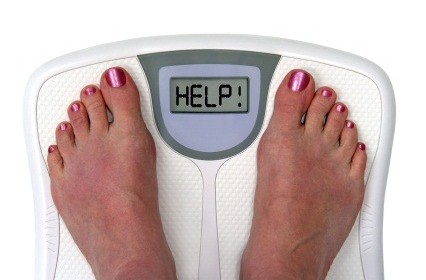While I am very serious about recovery, I have already started to worry about getting to a healthy weight. I have even considered stopping trying to gain weight before reaching my goal weight but know that this would be a bad idea. Afterall, as long as I am still feeling terrified about reaching a healthy weight, this is a good indication that I am still not healthy and that I need to continue repairing my body and mind. The following article sourced here explains why you should not stop gaining weight too early on in recovery and why having a healthy weight is essential for you to make a full recovery.
The Effects of Being Underweight
 Most people who have an eating disorder are not noticeably underweight. Many will under-eat at times and binge eat at other times, so that weight is maintained overall within normal limits.
Most people who have an eating disorder are not noticeably underweight. Many will under-eat at times and binge eat at other times, so that weight is maintained overall within normal limits.
However, some people with an eating disorder maintain extreme control over their diet, and remain significantly underweight.
One of the diagnostic criteria for Anorexia Nervosa is a body weight less than 85% of the weight expected for a particular height. This is serious, as being underweight has significant physical, psychological and social consequences, and these consequences are often seen in people with Anorexia.
The Psychological Effects of Being Underweight
Physical effects of being underweight include profound effects on the heart and circulation, muscles and bones, intestinal function, sleep and temperature regulation.
Mental and emotional consequences have also been noted. Mood is generally low, and irritability and anger are exacerbated.
There is a tendency to become socially withdrawn and inward-focussed, and people who are underweight have an increased need for predictability and routine, with difficulty being spontaneous. Thinking becomes rigid, and concentration and decision-making capacities are markedly impaired.
Preoccupation with food is usually intense, with almost constant thoughts about food and eating, such that it is common for underweight people to become very interested in cooking, recipes, cookery shows and so on, with a corresponding decrease in their engagement with previous interests and hobbies.
Obsessiveness increases, with people becoming inflexible in their routines, particularly around food. There may be rituals around food preparation, the order or way in which food is eaten, the timing and circumstances of meals, with people often needing to eat alone, and food may be eaten very slowly.
The Minnesota Starvation Experiment
An important study of the effects of starvation has had a profound impact on our understanding of these behavioural and psychological changes. This study was conducted in the early 1940’s and has subsequently been called the Minnesota Starvation Experiment. As Allied forces moved across German-occupied Europe, they encountered starved and emaciated civilians, many of whom had survived largely on bread and potatoes.
As little was known about the effects of starvation or how to deal with the re-feeding of these people, a study was conducted in which 36 psychologically healthy young volunteers were subjected to a six month period of semi-starvation, followed by a three month re-feeding period. During the starvation period the men were given about half the calories needed for weight maintenance, and most lost about 25% of their original body weight.
The physical, social and psychological effects of the starvation on participants were studied in great detail, and reported in a two-volume text called The Biology of Human Starvation. The participants:
- Developed an intense preoccupation with food, with most of their thoughts oriented towards what and how they would eat.
- Had significant impairment to their concentration, judgement and alertness.
- Ate extremely slowly, with unusual concoctions and heavy use of condiments, caffeine and chewing gum.
- Sometimes resorted to binge eating when the desire for food became intolerable.
- Became more depressed, irritable, angry and anxious, and sociability markedly decreased, with the men becoming withdrawn and socially isolated.
During the re-feeding phase the men had difficulty regaining control of their eating, and struggled to identify whether they felt hungry or full. For the majority of participants their eating behaviour did not return to normal until they had been at their pre-study weight for several months.
Clearly, as the participants in this study were psychologically and physically healthy prior to the experiment, all the behavioural and psychological features seen were direct effects of the starvation itself.
Personality Changes
The implications of this study for understanding the symptoms of Anorexia Nervosa are clear: The behaviours and psychological changes that occur in people with this illness are direct effects of being underweight, rather than being due to the illness itself, and therefore will begin to resolve once normal body weight is restored.
 The behaviours and characteristics shown are not indicative of peoples’ true personalities, which are in fact effectively masked by being underweight.
The behaviours and characteristics shown are not indicative of peoples’ true personalities, which are in fact effectively masked by being underweight.
It is therefore clear that the primary goal of treatment for an underweight person with an eating disorder is weight restoration.
Many of the features of his or her underweight behaviour and apparent personality change, will gradually disappear after normal weight is restored.
As found in the study participants, the body does not immediately return to being able to regulate food intake on its own, but consuming a well-balanced and nutritionally complete diet, spread regularly throughout the day, encourages the body to re-establish normal weight maintenance mechanisms.
It is very important for weight to be fully restored in order to reverse the starvation effects. If only partial weight regain occurs, the effort applied to achieve that weight gain will not be matched by equivalent gains in mental and physical health.
It is often difficult for an underweight person to engage with treatment initially because many of the effects of being underweight keep a person “locked-in” to the eating disorder, creating vicious circles that maintain the problems.
For example, the rigidity of thinking makes it difficult to make decisions or changes; the obsessional, inflexible approach to life makes it difficult to imagine eating or living differently; the social withdrawal reduces engagement with others and lowers mood; the preoccupation with food makes it difficult to consider engaging in other aspects of daily life. Support from others is likely to be centrally important in helping get through the weight-restoration stage of recovery.
Once the effects of being underweight have been reversed, other psychological factors that contributed to the development and maintenance of the eating disorder may need to be addressed, and areas of life which have been neglected will be re-developed.
If you (or somebody you love) have disordered eating patterns and are underweight, it is extremely important that you see a doctor and have a comprehensive medical assessment. Please consider making an appointment with me, so that we can discuss your situation and explore treatment options.
No comments:
Post a Comment